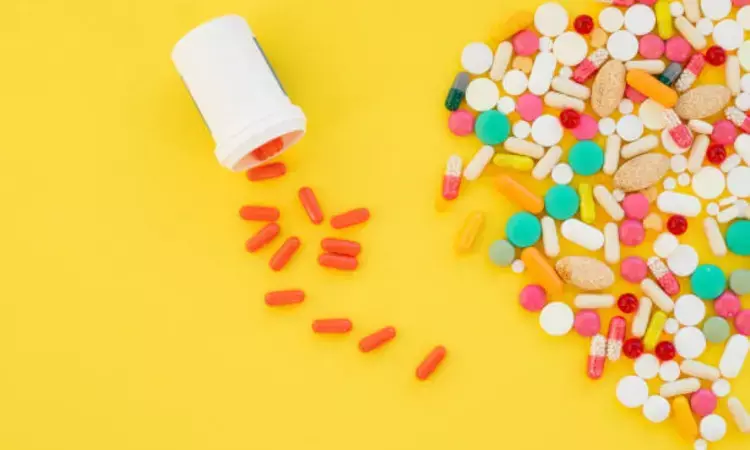- Home
- Medical news & Guidelines
- Anesthesiology
- Cardiology and CTVS
- Critical Care
- Dentistry
- Dermatology
- Diabetes and Endocrinology
- ENT
- Gastroenterology
- Medicine
- Nephrology
- Neurology
- Obstretics-Gynaecology
- Oncology
- Ophthalmology
- Orthopaedics
- Pediatrics-Neonatology
- Psychiatry
- Pulmonology
- Radiology
- Surgery
- Urology
- Laboratory Medicine
- Diet
- Nursing
- Paramedical
- Physiotherapy
- Health news
- Fact Check
- Bone Health Fact Check
- Brain Health Fact Check
- Cancer Related Fact Check
- Child Care Fact Check
- Dental and oral health fact check
- Diabetes and metabolic health fact check
- Diet and Nutrition Fact Check
- Eye and ENT Care Fact Check
- Fitness fact check
- Gut health fact check
- Heart health fact check
- Kidney health fact check
- Medical education fact check
- Men's health fact check
- Respiratory fact check
- Skin and hair care fact check
- Vaccine and Immunization fact check
- Women's health fact check
- AYUSH
- State News
- Andaman and Nicobar Islands
- Andhra Pradesh
- Arunachal Pradesh
- Assam
- Bihar
- Chandigarh
- Chattisgarh
- Dadra and Nagar Haveli
- Daman and Diu
- Delhi
- Goa
- Gujarat
- Haryana
- Himachal Pradesh
- Jammu & Kashmir
- Jharkhand
- Karnataka
- Kerala
- Ladakh
- Lakshadweep
- Madhya Pradesh
- Maharashtra
- Manipur
- Meghalaya
- Mizoram
- Nagaland
- Odisha
- Puducherry
- Punjab
- Rajasthan
- Sikkim
- Tamil Nadu
- Telangana
- Tripura
- Uttar Pradesh
- Uttrakhand
- West Bengal
- Medical Education
- Industry
Prophylactic antibiotics for one day okay after catheter removal following RP: Study

1-day regimen of prophylactic antibiotics is most beneficial after catheter removal following post-radical prostatectomy (RP), suggests a study published in the Journal of Urology.
Prophylactic antibiotics are routinely given at the time of catheter removal post-radical prostatectomy (RP). The low rate of infectious complications entails that large sample sizes are required for randomized controlled trials, a challenge gave the cost of standard randomized controlled trials.
A group of researchers from U.S.A evaluated infectious complications associated with 1 vs 3 days of prophylactic antibiotics at the time of catheter removal post-RP using a novel, clinically integrated trial with randomization at the surgeon level.
Surgeons were cluster randomized for periods of 3 months to prescribe 1-day vs 3-day regimen of prophylactic antibiotics at the time of catheter removal. The primary endpoint was an infectious complication as routinely captured by nursing phone call within 10 days of catheter removal and defined as positive urine cultures (≥105 CFU) and at least 1 of the following symptoms: fever (>38°C), urgency, frequency, dysuria or suprapubic tenderness.
The results of the study are as follows:
- A total of 824 patients were consented and underwent RP with, respectively, 389 and 435 allocated to 1-day and 3-day antibiotics, predominantly ciprofloxacin.
- Accrual was achieved within 3 years: 95% vs 88% of patients received the allocated 3-day vs 1-day antibiotic regimen.
- There were 0 urinary tract infections (0%) in the 1-day regimen and 3 urinary tract infections (0.7%) in the 3-day regimen, meeting our prespecified criterion for declaring the 1-day regimen to be non-inferior.
Thus, the researchers concluded that if surgeons choose to prescribe empiric prophylactic antibiotics after catheter removal following RP, then the duration should not exceed 1 day.
Reference:
The Duration of Antibiotics Prophylaxis at the Time of Catheter Removal after Radical Prostatectomy: Clinically Integrated, Cluster, Randomized Trial by Ehdaie B et. al published in the Journal of Urology.
Dr. Shravani Dali has completed her BDS from Pravara institute of medical sciences, loni. Following which she extensively worked in the healthcare sector for 2+ years. She has been actively involved in writing blogs in field of health and wellness. Currently she is pursuing her Masters of public health-health administration from Tata institute of social sciences. She can be contacted at editorial@medicaldialogues.in.
Dr Kamal Kant Kohli-MBBS, DTCD- a chest specialist with more than 30 years of practice and a flair for writing clinical articles, Dr Kamal Kant Kohli joined Medical Dialogues as a Chief Editor of Medical News. Besides writing articles, as an editor, he proofreads and verifies all the medical content published on Medical Dialogues including those coming from journals, studies,medical conferences,guidelines etc. Email: drkohli@medicaldialogues.in. Contact no. 011-43720751


